Book contents
- The Legal Legacy of the Special Court for Sierra Leone
- The Legal Legacy of the Special Court for Sierra Leone
- Copyright page
- Dedication
- Contents
- Preface and Acknowledgments
- Table of Authorities
- Abbreviations
- 1 Introduction
- 2 The Sierra Leone Conflict
- 3 The Establishment of the Special Court for Sierra Leone
- 4 The Special Court’s Jurisdiction, Organization, and Trials
- 5 “Greatest Responsibility” Personal Jurisdiction
- 6 Forced Marriage As a Crime Against Humanity
- 7 Child Recruitment As a War Crime
- 8 Head of State Immunity
- 9 Amnesties
- 10 Special Courts and Truth Commissions
- 11 Conclusion
- Appendices
- Selected Bibliography
- Index
5 - “Greatest Responsibility” Personal Jurisdiction
Published online by Cambridge University Press: 29 July 2020
- The Legal Legacy of the Special Court for Sierra Leone
- The Legal Legacy of the Special Court for Sierra Leone
- Copyright page
- Dedication
- Contents
- Preface and Acknowledgments
- Table of Authorities
- Abbreviations
- 1 Introduction
- 2 The Sierra Leone Conflict
- 3 The Establishment of the Special Court for Sierra Leone
- 4 The Special Court’s Jurisdiction, Organization, and Trials
- 5 “Greatest Responsibility” Personal Jurisdiction
- 6 Forced Marriage As a Crime Against Humanity
- 7 Child Recruitment As a War Crime
- 8 Head of State Immunity
- 9 Amnesties
- 10 Special Courts and Truth Commissions
- 11 Conclusion
- Appendices
- Selected Bibliography
- Index
Summary
This chapter begins the examination of the Special Court for Sierra Leone’s jurisprudence in a range of areas. It focused on Article 1(1) of the Special Court for Sierra Leone (SCSL) Statute giving that tribunal competence “to prosecute those who bear the greatest responsibility” for serious crimes committed during the Sierra Leonean conflict. The debate that arose during the SCSL trials was whether this statement constituted a jurisdictional requirement that the prosecution must prove beyond a reasonable doubt or merely a type of guideline for the exercise of prosecutorial discretion. The judges of the court split on this seemingly simple legal question. This chapter unpacks the reasoning of the SCSL. First, the chapter addresses the common ground among the judges and the Court’s ultimate conclusion that “greatest responsibility” implied that leaders, as well as the worst killers, may be prosecuted. Second, it demonstrates why the reasoning of the Appeals Chamber was results-oriented and wrong. Finally, referring to the work of other tribunals with a similar mandate, this chapter identifies the lessons of the Sierra Leone Court on greatest responsibility jurisdiction. It builds on them to offer preliminary recommendations on how the greatest responsibility confusion can be avoided when drafting personal jurisdiction clauses for future ad hoc international penal tribunals.
Keywords
- Type
- Chapter
- Information
- The Legal Legacy of the Special Court for Sierra Leone , pp. 107 - 149Publisher: Cambridge University PressPrint publication year: 2020



